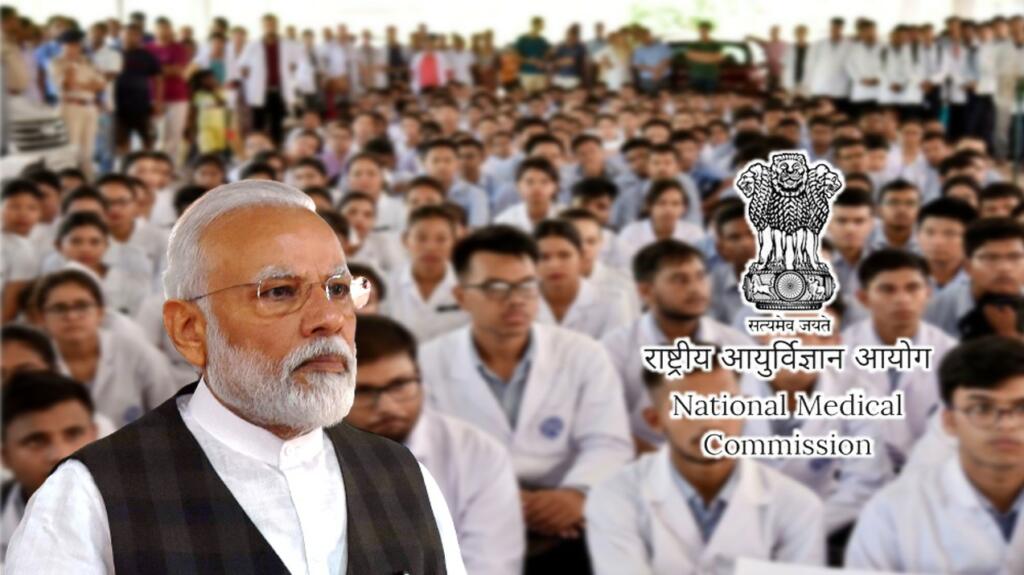- The National Medical Commission (NMC) has released new guidelines according to which the private medical colleges will have to give 50% of the seats to students at government fees.
- The number of seats for medical professionals is very low in India because there is very little private investment in medical education.
- A large number of students go to countries like Ukraine to get medical degrees but a very small percentage of them clear the FMGE exam due to poor quality of education. Thus, an increase in the supply of medical colleges, especially by the private players, is the need of the hour.
After the call for reforms in medical education for various institutions including the media, the government has taken initiatives to make private MBBS degrees cheaper. The National Medical Commission (NMC) has released new guidelines according to which the private medical colleges will have to give 50% of the seats to students at government fees.
Previously the government reformed the regulation of medical education and established National Medical Commission (NMC) under the National Medical Commission (NMC) Act, 2019. The new body has ended the corruption of the Medical Council of India, which was established in 1934 under the Indian Medical Council Act, 1933 to regulate medical education and practice. However, the MCI became a symbol of corrupt regulatory bodies along with the All India Council of Technical Education (AICTE). And finally, the Modi government reformed the institution to create NMC and gave it various powers including discretion on fees.
Now the NMC has utilized its discretion to come up with new guidelines. According to section 10(1)(i) of the National Medical Commission (NMC) Act, 2019, the panel shall frame guidelines for the determination of fees and all other charges for 50 per cent of the seats in private medical institutions and deemed-to-be universities governed under the provisions of this legislation.
Indian students go to many countries such as China, Russia, Ukraine, and others for medical education when they could not get admission into Indian medical colleges due to low ranks. The number of seats for medical professionals is very low in India because there is very little private investment in medical education and the fees as well as capitation fees (read bribes for admission) being around 1 to 2 crores.
Unlike private engineering colleges, which mushroomed across the country in the last two decades, the supply of medical colleges is still limited. Various reasons are responsible for this including the regulatory cholesterol which the Modi government has tried to clean in the last few years.
However, the students are still going abroad for medical degrees because the supply in the country is still low when compared to demand. Indian laws allow students to pursue MBBS courses from universities abroad. But to get a license to practice in India, they are required to qualify Foreign Medical Graduate Examination (FMGE) conducted by the National Board of Examination (NBE).
Read More: Affordable private medical institutions are the need of the hour for India
Clearing the FMGE test is mandatory for all doctors who have earned their MBBS degree from a foreign country. Only those who earn their MBBS and post-graduate degrees from Australia, Canada, New Zealand, the UK, and the US are exempted from this test.
A large number of students go to countries like Ukraine to get medical degrees but a very small percentage of them clear the FMGE exam due to poor quality of education. Thus, an increase in the supply of medical colleges, especially by the private players, is the need of the hour.
Read More: Why do so many students from India go to Ukraine for studies?
The new rule by NMC will make medical education in private colleges affordable. The government is also pushing for more investment in medical education and Prime Minister Modi also appealed to industrialists to invest in private medical colleges.
The likes of China, Russia and Ukraine are giving away degrees for easy effort as despite emerging as popular MBBS destinations, graduates from these countries have struggled to clear the mandatory screening test to practice in India.
All that is needed is an expansion of the medical education sector! Once the private sector makes a good investment in medical education, one decade down the line, medical education will be just like engineering and management education – affordable and accessible.
